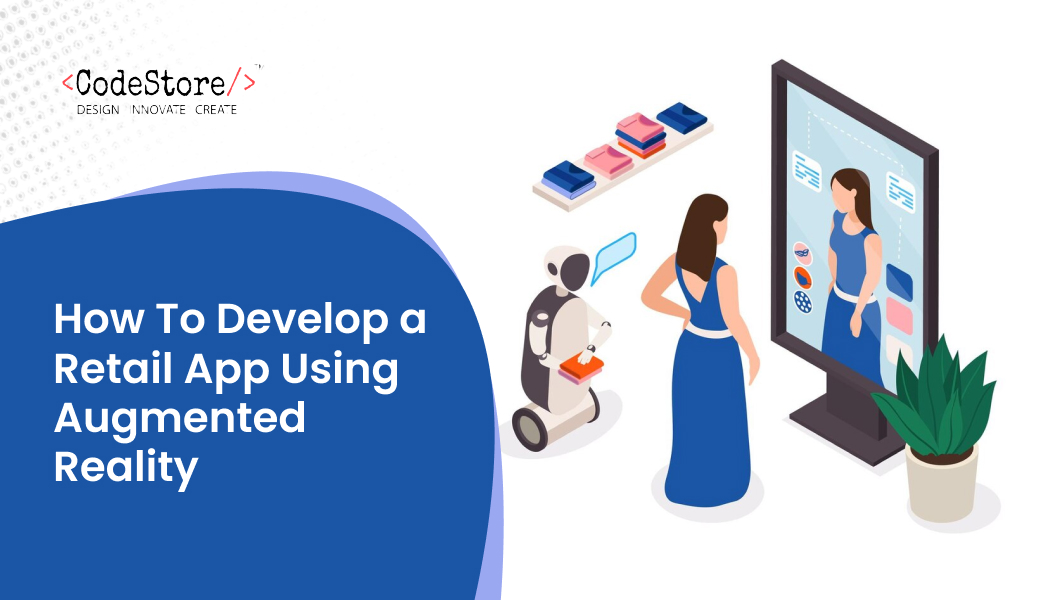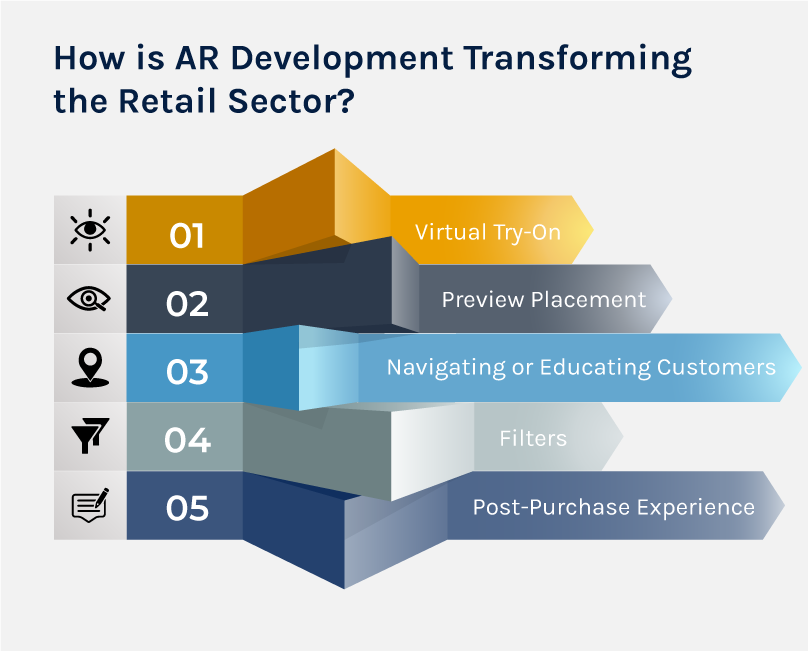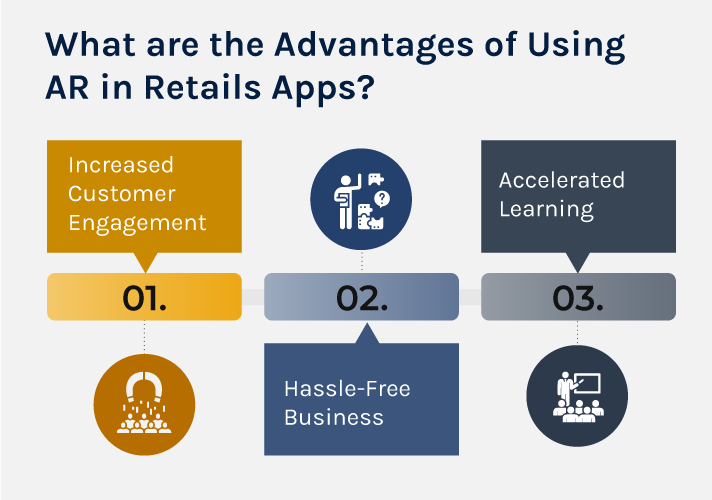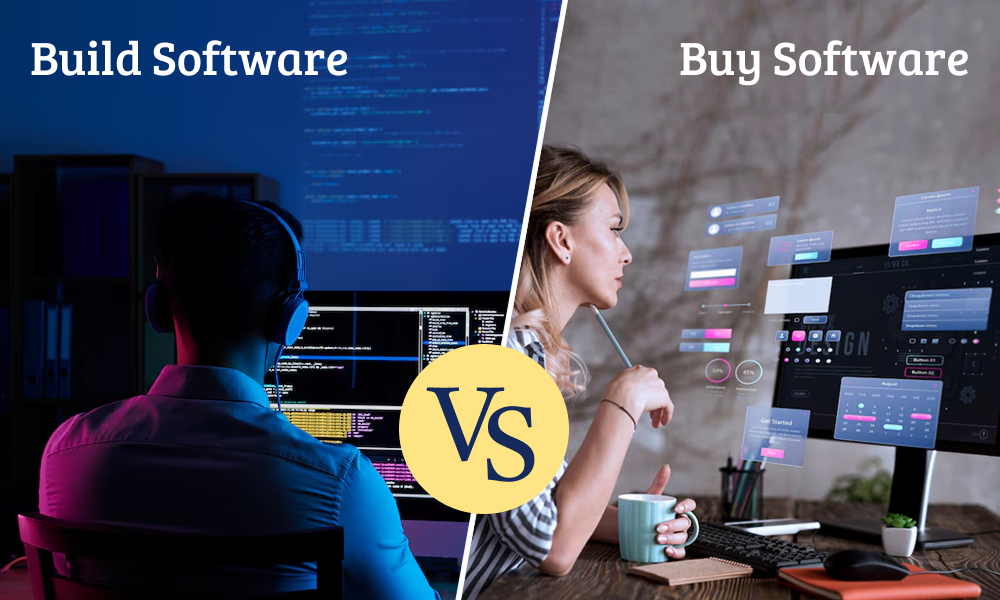table of content
- Introduction
- What is Augmented Reality?
- How Is AR Development Transforming the Retail Sector?
- Virtual Try-On
- Preview Placement
- Navigating or Educating Customers
- Filters
- Post-Purchase Experience
- What are the Advantages of Using Augmented Reality in Retails Apps?
- Increased Customer Engagement
- Hassle-Free Business With Less Returns
- Accelerated Learning
- How To Implement Augmented Reality in Your Retail App?
- Know Your Business Objectives
- Identify the Tools
- Promote Your Offerings Correctly
- How Can CodeStore Technologies Help You?
- Concluding Words
How To Develop a Retail App Using Augmented Reality

Introduction
Augmented Reality is transforming the way customers purchase their favorite products online on a retail app. They can preview the product by using advanced AR layers.
The retail system across the globe has transformed through the years. The role of the internet has become more than just a medium to avail services or purchase products.
The number of users purchasing things online has increased dramatically in recent years.
Statistics on retail eCommerce by Statista indicate that global sales of this sector have been increasing staggeringly every year, i.e., 3,354 billion US dollars in 2019, 4,280 billion US dollars in 2020, to 4,891 billion US dollars in 2021. The same statistics project that global retail eCommerce sales will reach 6,388 billion US dollars by 2024.
To support the versatile needs of such a large number of online shoppers, technology leaders have created a solid and credible digital infrastructure.
To align with the credibility element, retail or eCommerce app development companies use Augmented Reality (AR) as a principle technology. Hence, AR has a predominant and indispensable role to play in the market of online retail platforms.
This blog post will provide a complete understanding of the transformation led by AR in the retail sector. It will also guide you on how you can implement AR in the retail app.
Before getting deeper into the blog let’s have a brief idea about AR.
What is Augmented Reality?
Augmented Reality (AR) is a technology overlaying visual elements and information over real-world objects. It has become a popular technology trend that provides a more realistic and accurate user experience to the customers.
AR in retail apps has made it simpler for users to choose and try on their favorite products virtually.
AR is being used in many applications by different industries, might it be beauty or fashion. Like how the companies are using the eyewear AI for their customers, which frame looks good on them or the fashion-based companies can use it for how the clothes can match and look on them. It is helping retail companies and app developers enhance customer experience and presenting product or service demos.
How Is AR Development Transforming the Retail Sector?
AR has provided retail, the functionality that is needed to establish strong credibility. Most users would be skeptical about the actual quality of the products or services to be offered.
Online retail operations have become more client-oriented with the advent of AR-based applications.

Let us explore more on this.
Virtual Try-On
It is the most common application of AR, which can be in many eCommerce applications these days. Customers would try on their favorite clothes virtually and find out if the product really suits them. They can try different colors available for the same product in the application.
Preview Placement
Another common use case of AR in retail has been how customers can place the items virtually in the particular places of their home, office, or anywhere they would want to put them. They can preview if the furniture or other accessories would look good at a place before they actually buy it.
Navigating or Educating Customers
Retail companies are using AR to maintain the learning curve. Your customers might need your help to understand the basics and the best of your capabilities. You can use AR to create engaging user manuals and utilize your cloud capabilities and digital infrastructure to engage in simple navigation.
Filters
Filters are fun, aren’t they? But, everything that has an audience magnet and attracts users becomes a tool for branding. Not every industry gets this liberty to use social media filters, which are basically AR filters, for their own good.
Users are using Instagram filters, tagging the pages and helping them get more engagement. However, it is not always this easy, so you might need a tactical social media and design strategy for your use.
Post-Purchase Experience
What kind of post-purchase experience would your customers expect from you? It may be in terms of product knowledge, customer support, or perhaps some additional fun like providing them a mini-game in some part of the entire application.
By incorporating some AR-efficient tools in smart devices, technology leaders have not only increased their devices’ capability to interact with other electronic devices in the environment but took a crucial step toward a more connected digital infrastructure.
A small IC in your mobile phone is replacing a thermometer, speaker, or even measuring tape. We can certainly expect more from it. But, it is also an opportunity for Augmented Reality development companies to make their application more compatible with the evolving device hardware structure with strong compatibility with technology like AR.
What are the Advantages of Using Augmented Reality in Retails Apps?
Those who have used it might say ‘Yes’ in many cases when they are asked if AR in retail is advantageous for them. But, how does AR in retail apps help people, or what are its advantages?

Increased Customer Engagement
AR is a powerful tool for helping businesses to meet their customer engagement demands. It is bringing customers or visitors that add value to the organization’s existence as a brand. Investing in AR is more like investing in redesigning your website for improving the app’s influence or popularity.
Hassle-Free Business With Less Returns
Since the foundation of using AR in retail was for previewing products virtually, it has certainly reduced returns. Users check their products’ size or appearance using AR. It has simplified the retail process for vendors and customers.
Accelerated Learning
One of the most transformative innovations led by AR in the retail sector has been its advanced educational implementations. Retail apps are using AR for accelerating product education. They are using an interactive manual combined with AR filters.
There are several other customer-oriented AR applications helping businesses to interact directly with customers. As the technology evolves further, there can be much more transformative adaptation in the upcoming times.
How To Implement Augmented Reality in Your Retail App?
The process of implementing AR in retail apps begins with the idea of enhancing the application’s capabilities to interact with an expanded range of subjects i.e. devices or people who can be potential customers.
Here is where you can begin your journey towards adopting AR in your retail app.
Know Your Business Objectives
The fact that you want to advance your application by using AR also relies upon its usability for your business. Before investing your resources, you must understand the objectives you want to meet by implementing AR in your retail app. How are you going to benefit us through this combination of retail and AR? Since it is about customer experience, you need to ensure that your experiment is parameterized and not merely an example of trying something new without doing basic research about its demerits if there can be any.
AR is a technology that can have significant impacts on your business so you do not only have to see its technical aspect but also it’s business aspects.
Identify the Tools
With a clear vision, you can start finding the resources or tools to do things practically.
Software Integration: You can integrate a free or paid AR platform to scale up the app features. You can choose either of them but you must know that there will always be restrictions in a free version and you might need to pay to eliminate them after a time.
Choose Devices: It is probable that you might be thinking of implementing it in a mobile app, but you can also expand it to other devices such as laptops or tablets. You can ask an AR app development company to help you with the technical upgrades.
Operating System: Platform compatibility is a crucial element that you cannot afford to hamper. It would help if you made your retail app compatible with any popular OS, so you do not lose a part of the audience.
Compatibilities: Before you plan to create an AR-based retail app for any device or platform, you must be aware of the app’s hardware and software requirements. For example, some AR apps can only be run on Android devices having Gyroscope sensors.
Promote Your Offerings Correctly
As per Think With Google, 66% of respondents in a survey expressed their interest in using AR tools while purchasing a product. You can see the vibrant scope of opportunities in AR.
To reach more people and let them know what your product can do for them, you must promote your product and its capabilities in a rightful manner.
You cannot miss out on anything when it comes to product knowledge. From customers to your team members, you need to unfold the complete features. You can use comprehensive content in different formats i.e., blogs, videos, or even infographics, to educate them.
You can create a strategy where you and the app users can be a medium to reach more people.
How Can CodeStore Technologies Help You?
We, at CodeStore Solutions, have been transforming businesses with our efficient AR-based mobile and web app development solutions. Our services and offerings come with promising attributes of long-term experience, a wide portfolio in creating such applications, and a lot more than assures growth for an aspiring business organization.
You can get in touch with our team of experienced developers who can guide you with a constructive and systematic app development process.
Concluding Words
Augmented Reality is still transforming and setting up to expand further as the global business landscape for digitalized retail grows. Growth-seeking businesses are already investing in the promising future of augmented reality-led retail solutions. [number]




